Product Managers are at the heart of every successful product. They bridge the gap between various teams and ensure that the end product aligns with customer needs and business goals.
Essential skills for a Product Manager include market insight, product lifecycle knowledge, and strategic planning abilities, along with strong communication and problem-solving skills.
Candidates can write these abilities in their resumes, but you can’t verify them without on-the-job Product Manager skill tests.
In this post, we will explore 8 essential Product Manager skills, 10 secondary skills and how to assess them so you can make informed hiring decisions.
Table of contents
8 fundamental Product Manager skills and traits
The best skills for Product Managers include Market Analysis, Product Vision, Roadmap Planning, User Experience, Data-Driven Decision Making, Stakeholder Management, Agile Methodologies and Technical Proficiency.
Let’s dive into the details by examining the 8 essential skills of a Product Manager.
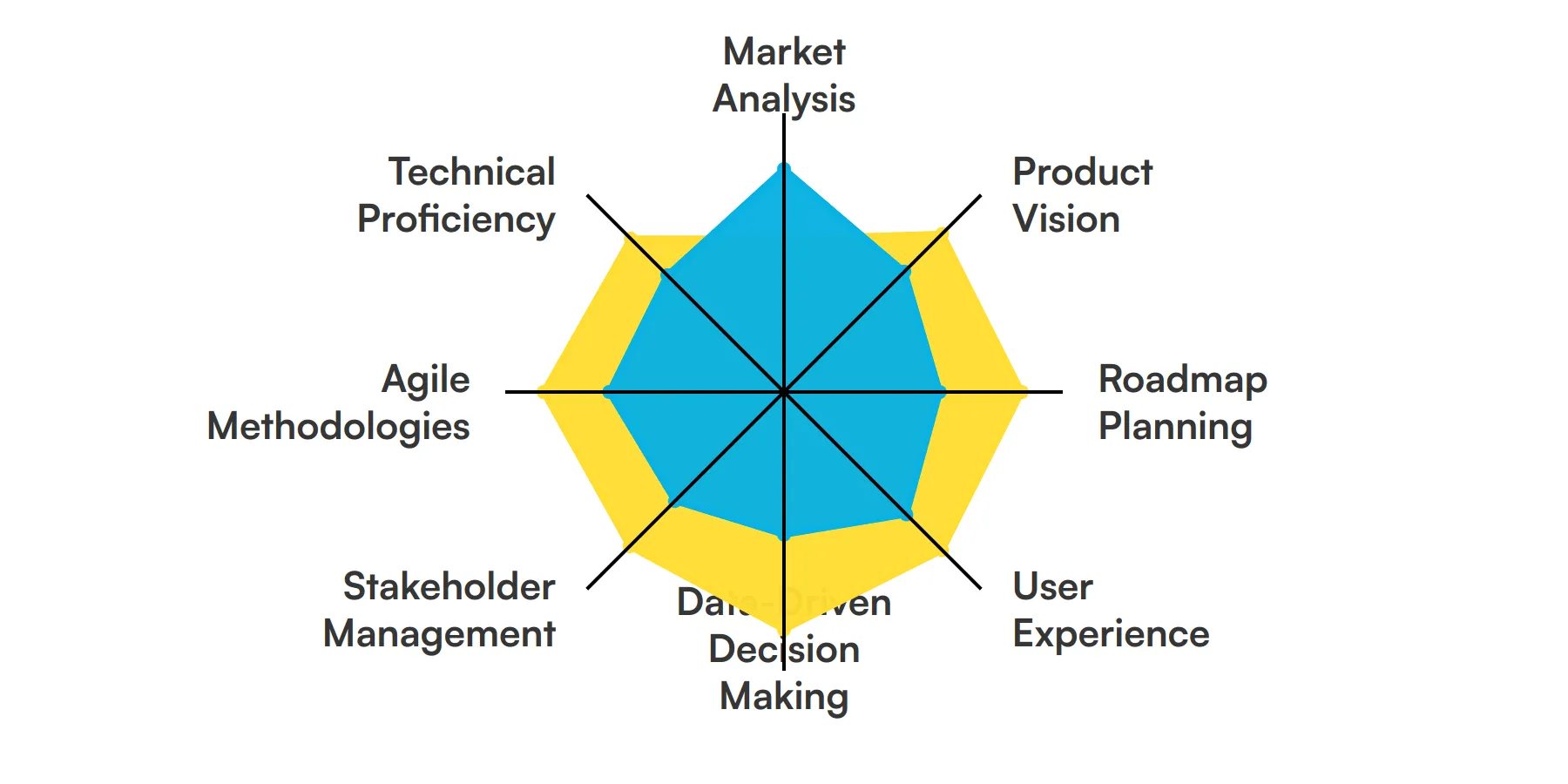
Market Analysis
A product manager must excel in market analysis to understand the competitive landscape and identify customer needs. This skill involves evaluating market trends, customer feedback, and competitor strategies to inform product development and positioning.
Product Vision
Setting a clear and compelling product vision is crucial for guiding cross-functional teams and aligning the product's direction with the company's strategic goals. The product manager uses this vision to motivate the team and make strategic decisions.
For more insights, check out our guide to writing a Product Manager Job Description.
Roadmap Planning
Effective roadmap planning ensures that the product's development aligns with business objectives and market demands. The product manager uses this skill to prioritize features, allocate resources, and set timelines for delivery.
User Experience
Understanding and prioritizing user experience is key to creating products that meet user needs and drive engagement. The product manager collaborates with designers to ensure the product is intuitive, accessible, and enjoyable.
Data-Driven Decision Making
The ability to make decisions based on data is essential for a product manager. This involves analyzing usage data, A/B testing results, and user feedback to make informed choices about product features and improvements.
Check out our guide for a comprehensive list of interview questions.
Stakeholder Management
Managing stakeholders effectively is necessary to gather diverse inputs and maintain support for the product. The product manager must communicate clearly and negotiate with stakeholders from various departments to ensure alignment and resource availability.
Agile Methodologies
Familiarity with agile methodologies is important for product managers as it allows them to adapt to changing market conditions and user feedback quickly. This skill helps in managing the development process and ensuring timely product iterations.
Technical Proficiency
While not needing to code, a product manager should understand the technical challenges and limitations of their product. This knowledge helps in making realistic decisions and communicating effectively with the engineering team.
10 secondary Product Manager skills and traits
The best skills for Product Managers include Financial Acumen, Project Management, Communication Skills, Customer Research, Competitive Intelligence, Regulatory Knowledge, Performance Metrics, Team Leadership, Innovation Management and Risk Management.
Let’s dive into the details by examining the 10 secondary skills of a Product Manager.
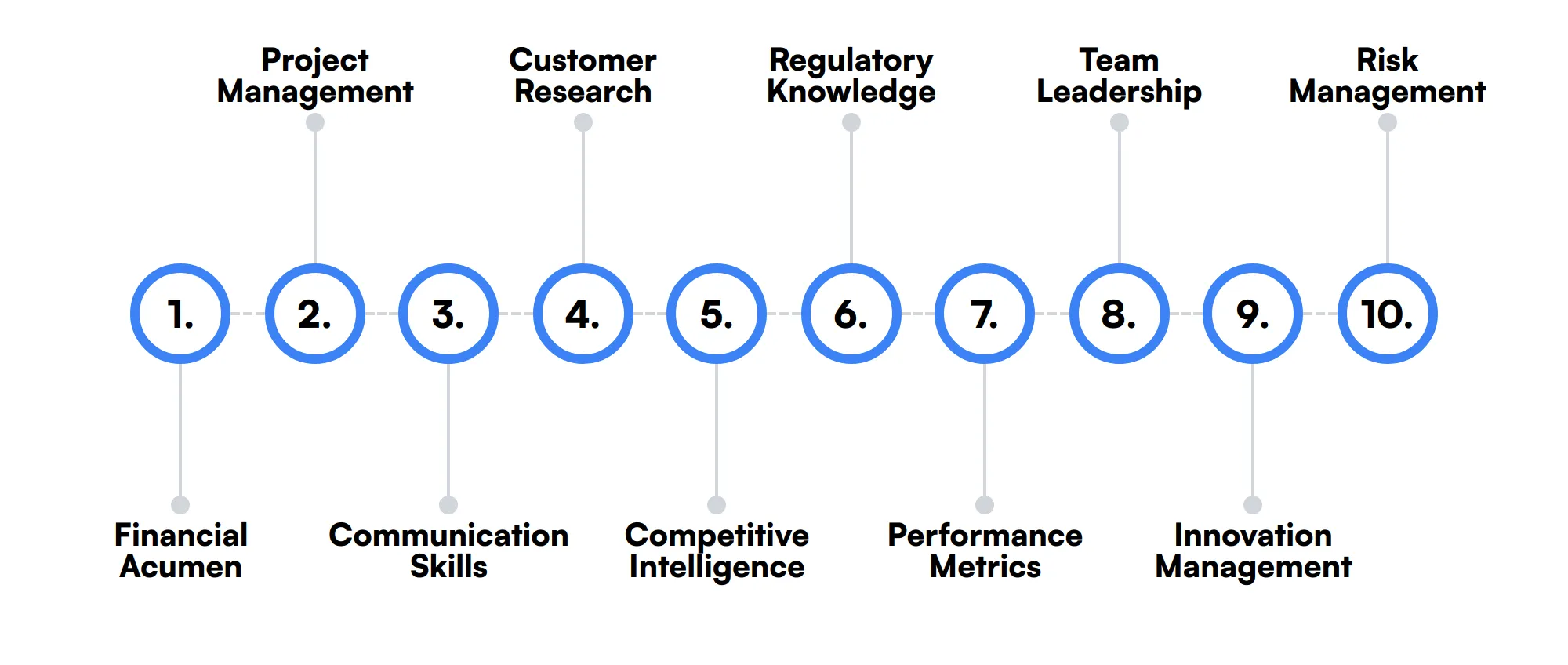
Financial Acumen
Understanding the financial impact of product decisions is important for ensuring the product contributes positively to the company's bottom line.
Project Management
Organizing and managing projects efficiently ensures that product initiatives are executed on time and within budget.
Communication Skills
Clear communication is essential for articulating the product vision, negotiating with stakeholders, and leading the team.
Customer Research
Conducting thorough customer research helps in understanding the end-user's problems and needs, which guides the product development process.
Competitive Intelligence
Keeping track of competitors' moves can provide insights that help in adjusting strategies and staying ahead in the market.
Regulatory Knowledge
Awareness of relevant regulations ensures that the product complies with legal standards and avoids costly penalties.
Performance Metrics
Monitoring and understanding key performance indicators helps in measuring the product's success and areas for improvement.
Team Leadership
Leading and motivating a team is important for maintaining productivity and fostering a positive work environment.
Innovation Management
Encouraging innovation within the team can lead to unique product features and improvements that provide a competitive edge.
Risk Management
Identifying and mitigating risks early in the product development cycle helps in avoiding delays and maintaining project scope.
How to assess Product Manager skills and traits
Assessing the skills and traits of a Product Manager is a nuanced process that involves more than just glancing at a resume. Product Managers are at the heart of a company's product development cycle, requiring a blend of technical and soft skills to succeed. Understanding how to evaluate these skills effectively is key to finding the right candidate for your team.
While traditional interviews offer insights into a candidate's experience and capabilities, they often fall short in accurately gauging deep competencies like Market Analysis, User Experience, or Data-Driven Decision Making. This is where structured assessments come into play. By using tailored tests, you can measure a candidate's abilities in areas such as Roadmap Planning, Stakeholder Management, and Agile Methodologies.
Adaface assessments provide a comprehensive way to evaluate these diverse skills without the lengthy process typically involved. With tools designed to assess not just technical proficiency but also strategic and operational thinking, Adaface tests can help streamline your hiring process, ensuring a 85% reduction in screening time while maintaining a high standard of candidate quality.
Let’s look at how to assess Product Manager skills with these 6 talent assessments.
Market Research Test
Our Market Research Test evaluates a candidate's ability to perform market research and analyze data effectively. This test is designed to measure skills in market research techniques, quantitative aptitude, and business intelligence.
The test assesses their understanding of market research, data analysis, market analysis, and data interpretation. It challenges candidates to apply these skills in practical scenarios to derive meaningful insights.
Successful candidates demonstrate a strong ability to interpret complex data sets and provide actionable market insights. This test includes questions that gauge proficiency in both theoretical knowledge and practical application of market research skills.

AI Product Manager Test
Our AI Product Manager Test is tailored to assess the unique skills required for managing AI-driven products. It evaluates a candidate's understanding of AI fundamentals, product strategy, and project management.
This test covers a range of topics including AI applications, data modeling, and business analysis. It simulates real-world problems to test the candidate's ability to strategize and manage AI projects effectively.
Candidates who excel in this test are proficient in navigating the complexities of AI product management, demonstrating strong project management and strategic decision-making skills.
UI/UX Design Test
Our UI/UX Design Test focuses on evaluating a candidate's design thinking and application of UI/UX principles. It tests skills in wire-framing, prototyping, and user research.
The test challenges candidates to apply their knowledge in UX design principles, interaction design, and visual design to solve user-centered design problems.
High-scoring candidates will demonstrate a deep understanding of user needs and the ability to design intuitive and aesthetically pleasing interfaces.
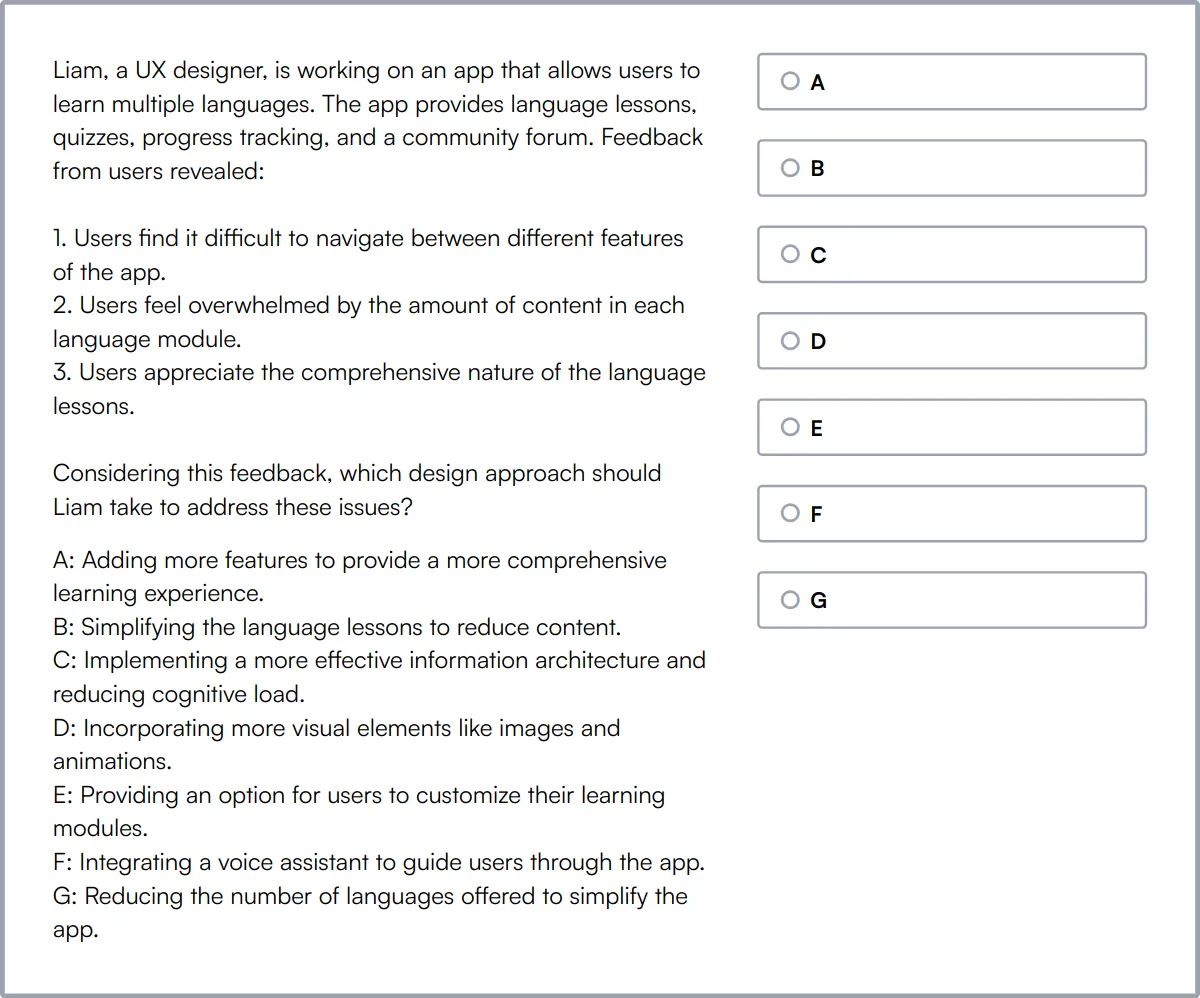
Data Science Assessment Test
Our Data Science Assessment Test measures a candidate's expertise in data manipulation, visualization, and predictive modeling. It evaluates proficiency in using tools like Python or R for data analysis.
The test assesses skills in statistics, machine learning techniques, and data cleansing. Candidates are required to demonstrate their ability to extract insights from data using advanced analytical techniques.
Successful candidates will show a strong command of data science fundamentals and the ability to apply statistical models to real-world problems.
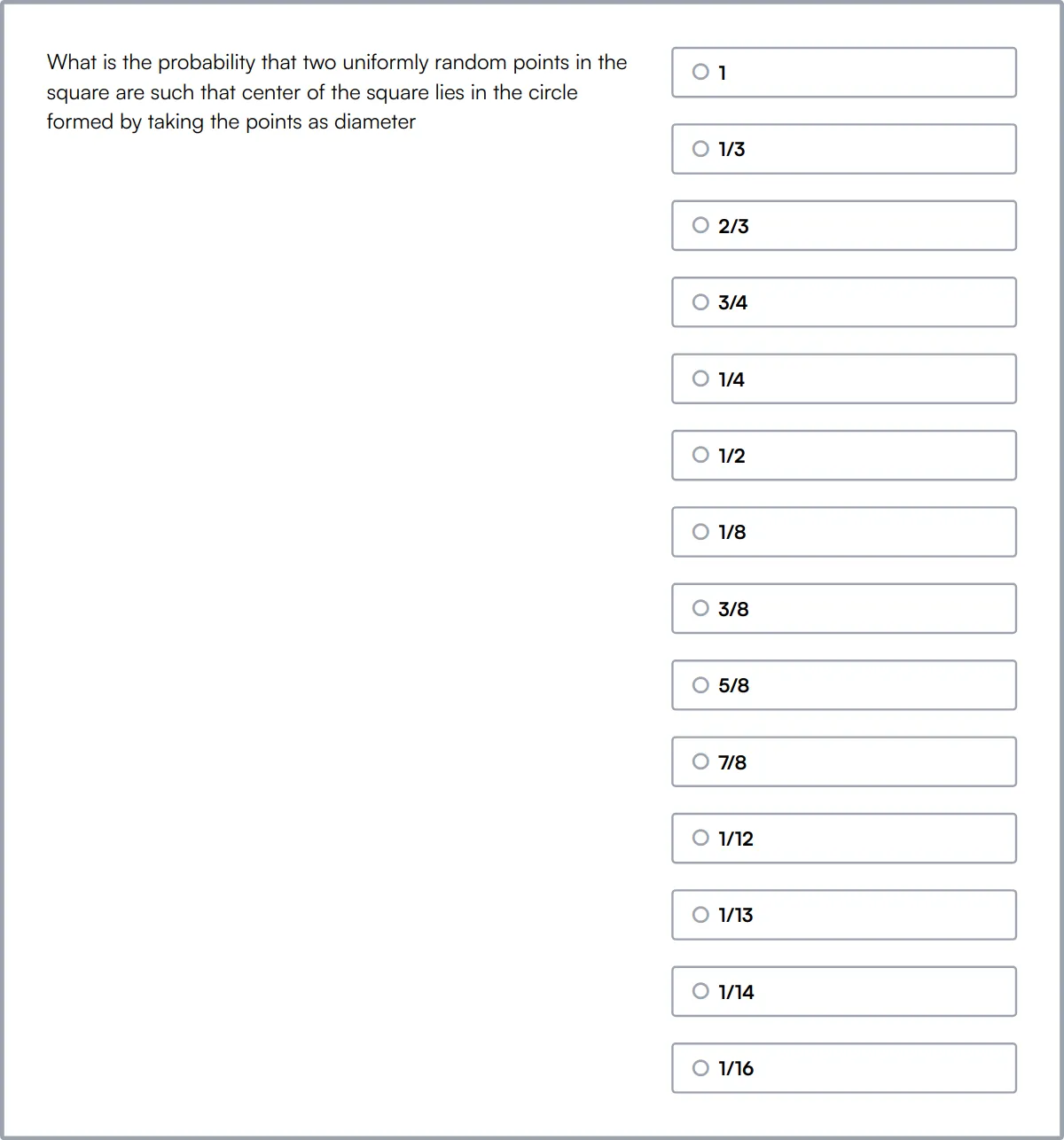
Scrum Master Test
Our Scrum Master Test evaluates a candidate's understanding of the Scrum framework and agile principles. It tests knowledge in areas such as sprint planning and product backlog management.
This test covers Scrum roles, artifacts, and events, challenging candidates to demonstrate their proficiency in managing agile projects and facilitating Scrum ceremonies.
Candidates who perform well on this test typically exhibit strong leadership skills and a thorough understanding of agile methodologies, enabling them to effectively guide teams in agile environments.
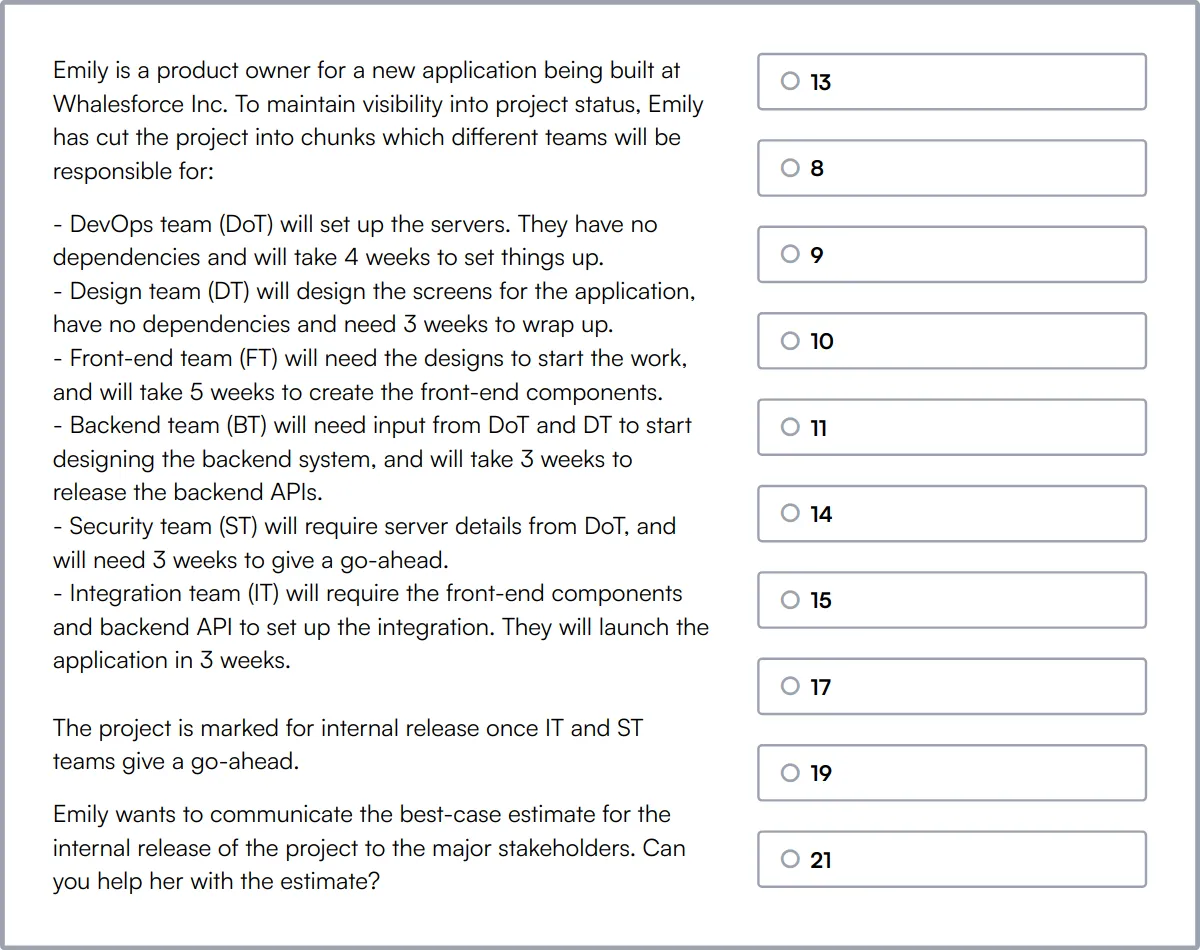
Technical Aptitude Test
Our Technical Aptitude Test is designed to evaluate a candidate's general technical knowledge and problem-solving skills. It covers a broad range of topics from programming fundamentals to system administration.
The test assesses candidates on their understanding of data structures, algorithms, and technical aptitude. It includes scenario-based questions that require candidates to apply their knowledge to solve technical problems.
High-scoring candidates demonstrate a strong ability to think analytically and solve complex technical challenges, making them well-suited for roles that require a high level of technical proficiency.
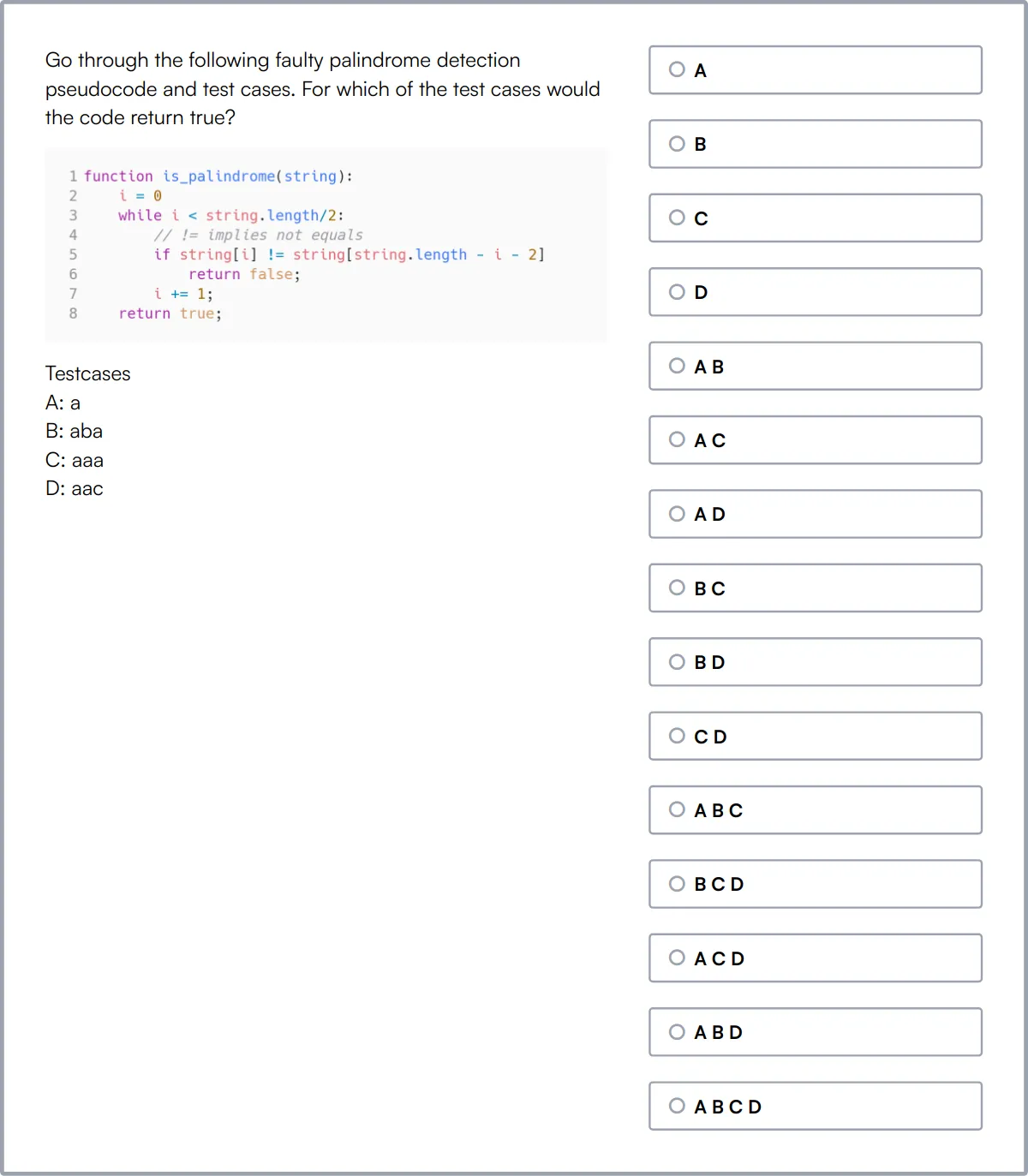
Summary: The 8 key Product Manager skills and how to test for them
| Product Manager skill | How to assess them |
|---|---|
| 1. Market Analysis | Evaluate ability to analyze market trends and consumer needs. |
| 2. Product Vision | Assess clarity and innovation in setting product direction. |
| 3. Roadmap Planning | Check competence in outlining product development milestones. |
| 4. User Experience | Review skills in designing intuitive and engaging interfaces. |
| 5. Data-Driven Decision Making | Judge proficiency in using data to make informed choices. |
| 6. Stakeholder Management | Determine capability to manage and satisfy stakeholder expectations. |
| 7. Agile Methodologies | Test knowledge and application of agile practices. |
| 8. Technical Proficiency | Evaluate understanding of relevant technology and tools. |
Product Owner Test
Product Manager skills FAQs
What is the importance of market analysis in a Product Manager role?
Market analysis helps Product Managers understand market trends, customer needs, and competitive landscape. This knowledge guides product development and positioning.
How can recruiters assess a candidate's ability to create a product vision?
Ask candidates to describe a product vision they have created in the past. Look for clarity, strategic thinking, and alignment with market needs.
What are key indicators of strong roadmap planning skills?
Effective roadmap planning includes clear timelines, prioritization of features, and alignment with business goals. Ask for examples of past roadmaps.
Why is user experience important for Product Managers?
User experience ensures that the product is intuitive and meets user needs. Good UX can lead to higher user satisfaction and retention.
How do Product Managers use data-driven decision making?
They analyze data to inform product decisions, track performance, and validate hypotheses. Look for experience with analytics tools and data interpretation.
What makes stakeholder management a key skill for Product Managers?
Product Managers must align diverse stakeholders, including executives, developers, and customers, to ensure product success. Effective communication and negotiation are essential.
How can technical proficiency benefit a Product Manager?
Technical proficiency helps Product Managers understand development constraints, communicate with engineering teams, and make informed decisions about product features.
What role does financial acumen play in product management?
Financial acumen allows Product Managers to budget effectively, forecast revenue, and make cost-benefit analyses. This ensures the product is financially viable.

40 min skill tests.
No trick questions.
Accurate shortlisting.
We make it easy for you to find the best candidates in your pipeline with a 40 min skills test.
Try for freeRelated posts
Free resources



